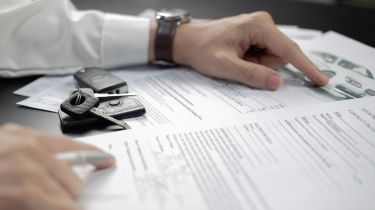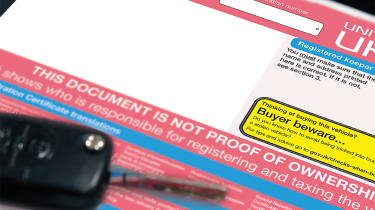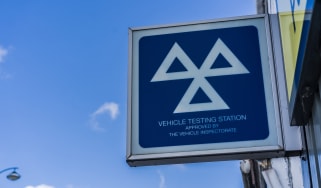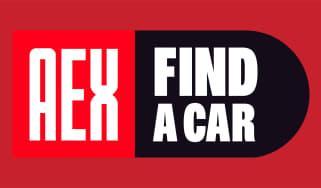What paperwork do I need to sell my car in the UK?
Our checklist of the documents you need to sell your car will help you make sure that you don’t miss anything when making that sale

Congratulations! You’ve just sold your car. Before your attention turns to how you’ll spend the money, though, let’s just make sure that all the paperwork is in order.
Whether you’re selling your car privately, part-exchanging with a dealer or using an online car buying service for a quick sale, you’ll need certain documents to make sure you get the best price and that the car is legally transferred to its new owner.
In this guide we’ll run through all the paperwork you need to sell your car in the UK. Some of it is essential and other documents are simply nice to have for the purposes of convincing would-be buyers of the car’s condition and value.
Scroll down for our car seller’s paperwork checklist with details of why each document matters.
V5C log book
The V5C log book is the most important document for car sellers. It shows that you are the car’s registered keeper and allows you to transfer that status to the new owner of the car when you sell it.
The V5C form has different sections for different car selling circumstances. If you’re selling the car privately, you fill out the section for transferring ownership to a new owner and send it off to the DVLA. This process can also be completed online via the GOV.UK website. The DVLA will then send a new V5C form to the new keeper’s address.
Until you notify the DVLA of the transfer, you will technically still be liable for any speeding tickets, missed road tolls, congestion charges or parking fines accrued on the car. You could also get a fine of £1,000 for not informing the DVLA that the car is sold, so it’s important to do this properly and promptly.

If you’re selling the car to a dealer or anyone in the motor trade, there’s a different section of the V5C to complete. The dealer will usually complete the paperwork for you, notifying the DVLA.
If you don’t have the V5C log book for your car, you can still sell the car but the process is likely to be much more complicated. We certainly wouldn’t recommend buying a car in a private sale if the person selling it doesn’t have the car’s correct V5C logbook. It’s much better to get a replacement V5C, by applying for one on the DVLA website, before advertising your car for sale.
How to fill out the V5C
Selling a car privately (Old V5C - pre 2012)
- If you have the old style V5C document issued before 2012, complete section 10 and give it to the new owner.
- Complete section 6, then both you and the new owner sign section 8 and the whole remaining form goes to the DVLA.
- Rather than completing the form by hand, you can do it on the GOV.UK website.
Selling a car privately (New V5C)
- If you have the new style V5C logbook introduced in 2012, you complete section 6 and give it to the new keeper. This will allow them to tax the car while they wait for the new V5C to arrive.
- Complete section 2 and send this with the rest of the remaining form to the DVLA.
- Rather than completing the form by hand, you can do it on the GOV.UK website.
How to fill out the V5C when selling your car to a dealer
- If you have the old V5C form issued before 2012, you complete section 9 and send it to the DVLA.
- If you have the new type of V5C, you complete section 4 and send that to the DVLA.
- The dealer will keep the rest of the form.
Service history
It’s not essential to have a service history when selling a car but it certainly helps. The car’s service book serves as a record of the maintenance that has been carried out throughout its lifetime, so a full service history is a definite plus for car buyers.
The service book is usually in a folder with the car’s owner’s manual and will have a series of stamps from garages that have carried out servicing work on the car over the years. If one of the manufacturer’s scheduled services has been missed, it should show in the record in the form of a missing stamp.

Receipts for repairs and maintenance
In addition to the car’s service history it’s useful to retain any receipts for other repair or maintenance work that’s been carried out. This will help prove the age of certain parts and help reassure a buyer that the car has been well looked after in the past.
MOT certificate
Cars over three years old must have an MOT certificate in order to be driven legally on the road, so prospective buyers will want to see it. These days, a car’s MOT history is available online, and buyers will often take a look at this publicly available information before agreeing to buy a car. This record shows any MOT failures or advisories and will confirm if the car has a current MOT or not.
Car warranty documents
It’s possible that the car you’re selling may have part of the manufacturer’s warranty left to run, or there could be a used car warranty from when you purchased the vehicle that will transfer to the new owner. If there’s any kind of warranty that applies, this could be a good selling point for the car. Be sure to hand over the relevant warranty paperwork to the new owner when the deal is done.
Owner’s manual
It should be tucked away in the glovebox but if you’ve got the car’s owner’s manual stored elsewhere remember to hand it over to the new owner. There may be systems, settings and controls on the car that will be difficult to work out and the owner’s manual should contain all the answers.
Finance settlement letter
If you’re selling a car with outstanding finance, you’ll need to give the buyer the finance settlement letter to show the final settlement figure and the finance company’s details.
Purchase receipt or proof of reservation
It’s increasingly rare that a car will be bought for cash these days but if you are taking a full payment or a deposit to reserve the car in cash, you will want to give the buyer a receipt for the money they’ve given you. This is a sensible way of avoiding any unexpected issues or misunderstandings further down the line.

A receipt can just be drawn up yourself on a piece of paper but it should contain the following information.
- The name of the seller
- The name of the buyer
- Details of the car including the make, model, registration and VIN numbers
- The amount of the payment or deposit
- The date that the payment was made
- If applicable, the agreed purchase price of the car and any amount outstanding that needs to be paid before collection of the vehicle.
- Signatures of the seller and buyer
Both yourself and the buyer should have a copy of this document and you can make additional receipts when subsequent payments are made.
There may be other documents that you have relating to the car you’re selling and it makes sense to hand anything useful and relevant over to the new owner. Once the car is gone, the paperwork isn’t going to be of much use to you.
Did you know you can sell your car with Auto Express? Get the highest bid from our network of over 5,500 dealers and we'll do the rest. Click here to try Auto Express Sell My Car now...
Find a car with the experts









